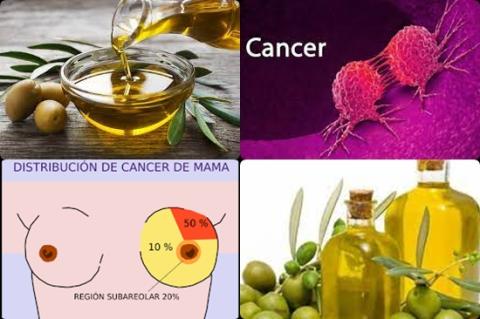
Objectives:
Does a high olive oil consumption reduce cancer risk?
Study design:
This review article included 37 case-control studies with 17,369 cases (persons with cancer) and 28,294 controls (persons without cancer) and 8 cohort studies with 12,461 incident cases among 929,771 subjects (participants).
Significant publication bias was detected via Egger’s test in the analysis on overall cancer risk [p 0.001], breast cancer [p = 0.013] and gastrointestinal cancer risk [p = 0.048].
Results and conclusions:
The investigators found in pooled analysis of case-control and cohort studies that highest olive oil consumption was significantly associated with a 31% lower risk of any cancer [pooled RR = 0.69, 95% CI = 0.62 to 0.77].
Significantly means that there is an association with a 95% confidence.
The investigators found subgroup analyses showed that the protective effect of high olive oil consumption in terms of cancer risk was also significant in case-control studies [37 study arms, RR = 0.65, 95% CI = 0.57 to 0.74] but not in cohort studies [8 study arms, RR = 0.90, 95% CI = 0.77 to 1.05].
Furthermore, the protective association was also found in a multivariate analysis [32 study arms, RR = 0.72, 95% CI = 0.65 to 0.81], a high study quality analysis [RR = 0.72, 95% CI = 0.64 to 0.81], Mediterranean participants [RR = 0.69, 95% CI = 0.60 to 0.79] and non-Mediterranean participants [RR = 0.49, 95% CI = 0.34 to 0.71].
The investigators found in pooled analysis of case-control and cohort studies that highest olive oil consumption was significantly associated with a 33% lower risk of breast cancer [pooled RR = 0.67, 95% CI = 0.52 to 0.86].
Significantly because RR of 1 was not found in the 95% CI of 0.52 to 0.86. RR of 1 means no risk/association.
The investigators found subgroup analyses showed that the beneficial effect was reproducible in case-control studies [RR = 0.63, 95% CI = 0.45 to 0.87] but not in cohort studies.
Furthermore, high olive oil consumption was linked to a reduced breast cancer risk in Mediterranean [RR = 0.67, 95% CI = 0.49 to 0.92] and non-Mediterranean populations [RR = 0.25, 95% CI = 0.07 to 0.89].
The investigators found in pooled analysis of case-control and cohort studies that highest olive oil consumption was significantly associated with a 23% lower risk of gastrointestinal cancer [pooled RR = 0.77, 95% CI = 0.66 to 0.89].
Subgroup analyses showed an inverse relationship between highest olive oil consumption and risk for esophageal cancer [RR = 0.47, 95%CI = 0.24 to 0.93] and pancreatic cancer [RR = 0.58, 95% CI = 0.35 to 0.97].
Furthermore, significant effects were also found in case-control studies [RR = 0.72, 95% CI = 0.61 to 0.85), studies within the Mediterranean area [RR = 0.77, 95% CI = 0.67 to 0.88], multivariate analyses [RR = 0.76, 95% CI = 0.63 to 0.90] and high quality studies [RR = 0.73, 95% CI = 0.62 to 0.86].
The investigators found in pooled analysis of case-control and cohort studies that highest olive oil consumption was significantly associated with a 26% lower risk of upper aerodigestive cancer [pooled RR = 0.74, 95% CI = 0.60 to 0.91].
Subgroup analyses showed results remained significant for case-control studies [RR = 0.74, 95% CI = 0.60 to 0.91], multivariate analyses [RR = 0.75, 95% CI = 0.66 to 0.86] and studies of high quality [RR = 0.68, 95% CI = 0.52 to 0.89].
The investigators found in pooled analysis of case-control studies that highest olive oil consumption was significantly associated with a 54% lower risk of urinary tract cancer [pooled RR = 0.46, 95% CI = 0.29 to 0.72].
Subgroup analyses showed results remained significant for studies of high quality [RR = 0.46, 95% CI = 0.32 to 0.66].
The investigators concluded highest versus lowest olive oil consumption is associated with 31% lower cancer risk, especially for breast, overall gastrointestinal, upper aerodigestive and urinary tract cancer. Additional prospective cohort studies on various cancer types, especially in non-Mediterranean regions, as well as large randomized trials, seem desirable in order to provide further insight into the role of olive oil in preventing cancer.
Original title:
Olive oil intake and cancer risk: A systematic review and meta-analysis by Markellos C, Ourailidou ME, […], Psaltopoulout T.
Link:
https://www.ncbi.nlm.nih.gov/pmc/articles/PMC8751986/
Additional information of El Mondo:
Find more information/studies on cancer, olive oil consumption right here.
The conclusions in scientific studies are even more reliable when they are also found in cohort studies, multivariate analyzes (studies where adjustments were made for multiple confounding factors) and high-quality studies.